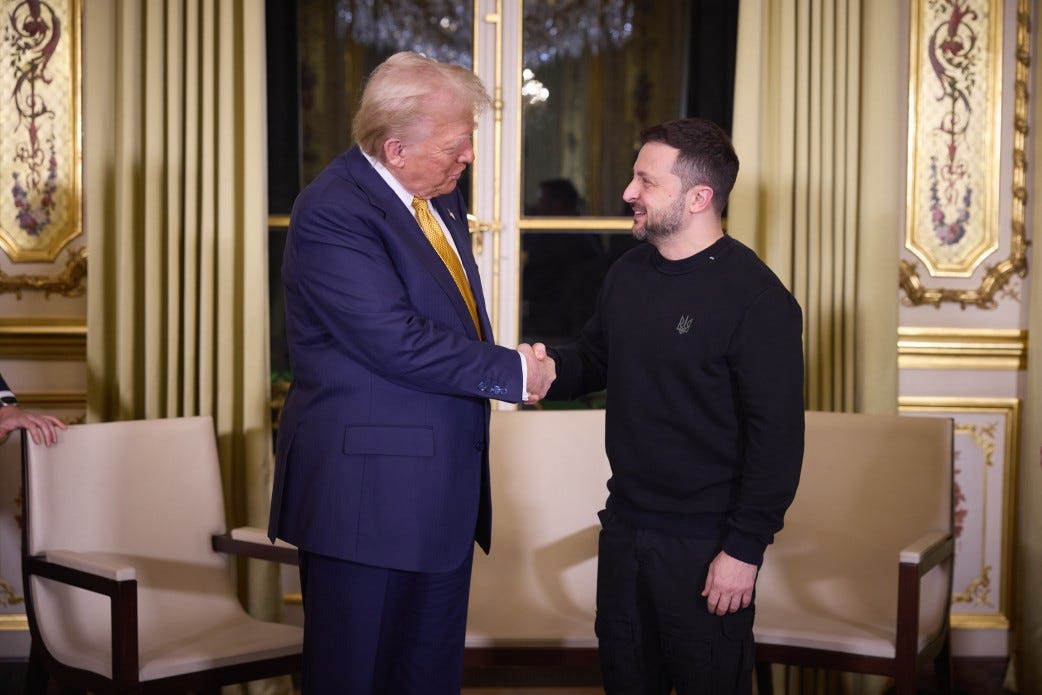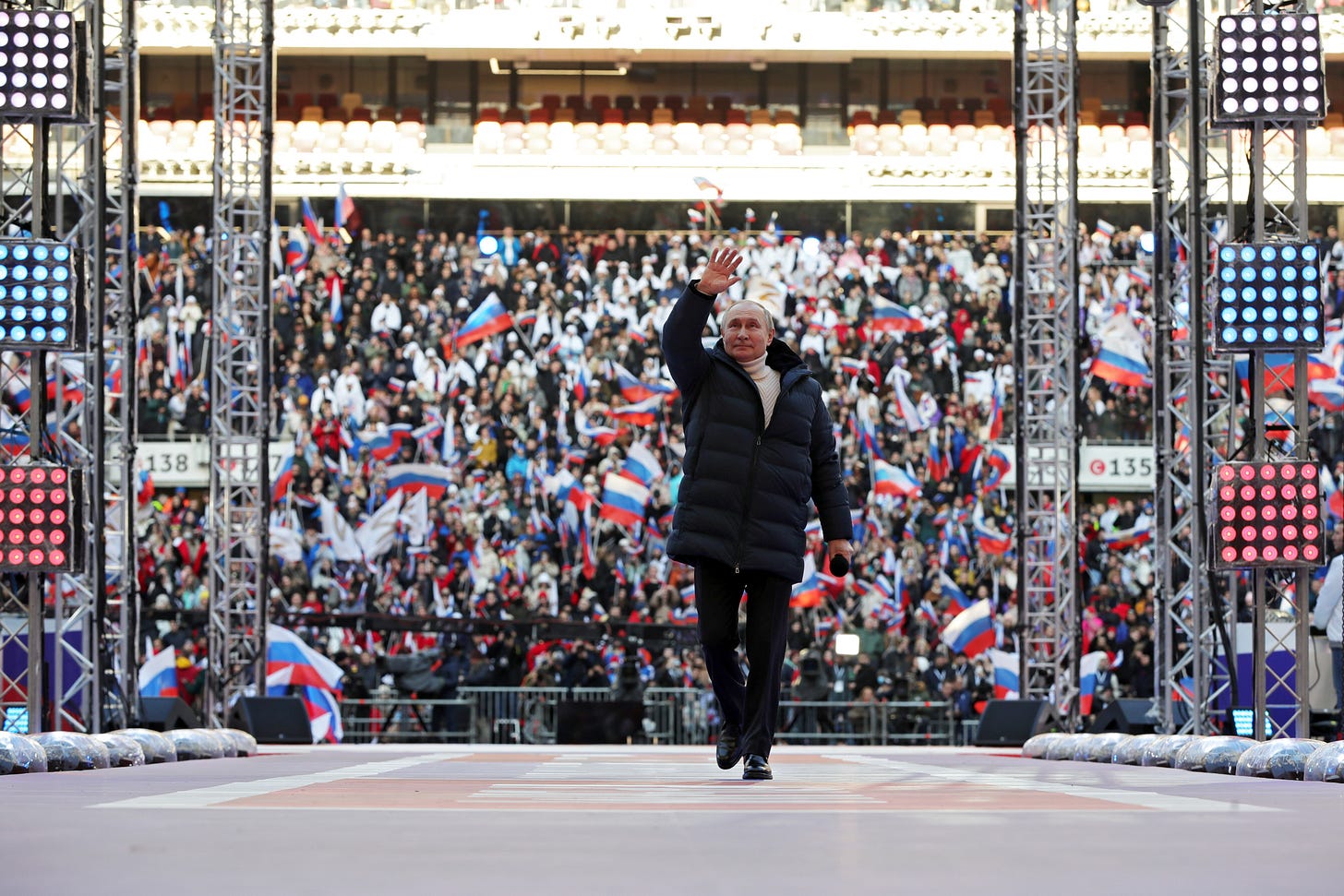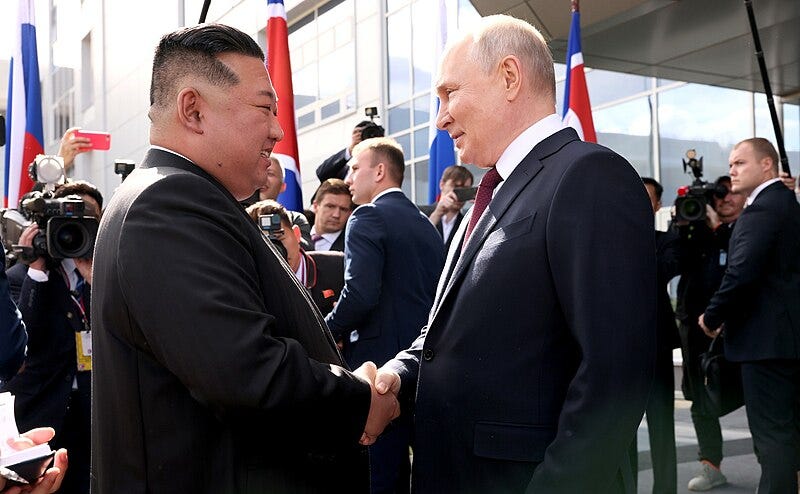Trump's self-interest could prevent him from abandoning Ukraine
A Russian victory in Ukraine would be a political disaster for Trump

Ted Gistaro is a career CIA analyst who was responsible for briefing President-elect Donald Trump in 2016. It wasn’t an easy job. Asked how closely Trump read the presidential daily briefing, Gistaro said, “He touched it. He doesn’t really read anything.” Gistaro’s boss, Director of National Intelligence James Clapper, echoed this observation: “Trump doesn’t read much; he likes bullets.” Vice President Mike Pence recommended that people briefing Trump should “lean forward on maps.” What will Trump’s intelligence briefings look like in a second term? A few words scrawled in crayon on a McDonald’s napkin?
Trump has always been a low-information president. He once said, “My gut tells me more sometimes than anybody else’s brain can ever tell me.” He does have impressive gut instincts for demagoguery, self-promotion, bullying, and bending entire political parties to his will. But Trump’s gut can only get him so far. As he prepares to take office in a world that has changed dramatically since he last occupied the White House four years ago, his gut feeling about several of the most urgent issues he’ll confront right away will soon collide with reality.
One of those issues is the war in Ukraine, which Trump’s gut tells him can be solved in a single day. When this delusion is shattered, it won’t just expose Trump’s arrogant complacency as wishful thinking — it will prove to be a far greater crisis for his administration than he can imagine.
The historian Robert Kagan recently published an essay in The Atlantic about the consequences of a Russian victory in Ukraine. He argues that the incoming administration, as well as many Western analysts and pundits who support a deal with Vladimir Putin to end the war, are “negotiating with themselves.” Putin has never expressed a willingness to accept anything less than the total destruction of Ukraine as a viable independent state. He won’t be content with the chunk of territory he has stolen in the country’s east. He won’t accept the survival of the Zelensky government, even if he secures assurances of neutrality on issues like NATO accession and EU membership. He wants to end Ukrainian sovereignty entirely, and this has always been his long-term goal.
Kagan warns that Putin is closer to achieving this goal than he has been at any point since the beginning of the war. The Russian economy, propped up by China and growing exports to neutral countries like India, has proven surprisingly resilient. Putin has converted Russia’s economy into a Soviet-style war machine — Moscow is now spending 6 percent of GDP on defense, around twice the proportion the United States spends. Ukraine’s lack of equipment and manpower is more urgent than Russia’s, which is why a new infusion of military aid from the U.S. this year is critical. Kagan believes an elimination of aid could cause a “complete collapse of Ukrainian morale on the military and the home front.” These are the reasons Putin has little incentive to negotiate in good faith — he thinks he can win.
A Russian victory in Ukraine would be a political disaster for Trump. After assuring Americans that ending the war will be trivially easy — Trump often claims that he’ll have a settlement within “24 hours” once he takes office — it would be bad enough if a deal proves elusive in Ukraine and the war drags on. It would be far worse if Russian forces break through the Ukrainian lines and have another shot at Kyiv. And it would be a devastating defeat for the United States, its allies, and the entire concept of a liberal international order — as well as a political nightmare for Trump — if Putin succeeds in toppling the Zelensky government. Putin has always presented the war as a confrontation with NATO, and the United States in particular. If Kyiv falls, it will be one of the United States’ greatest strategic failures this century, and Trump will have to own it.
Putin and Trump have built their respective cults of personality around the projection of strength. During the chaotic withdrawal from Afghanistan, Trump attacked President Joe Biden for his “weakness, incompetence, and total strategic incoherence.”1 As always, Trump led with “weakness.” If Ukraine falls, the personal mythology Trump has built around his strength — as well as his manufactured reputation as a great dealmaker — will look ridiculous. As Kagan puts it: “Trump has created and cherished an aura of power and toughness, but that can quickly vanish.” The president has far more power and autonomy in foreign policy than in domestic affairs. Being outmaneuvered so completely by one of America’s greatest enemies will be an inarguable blow to Trump’s obsessively cultivated image of strength.
One reason Putin is especially confident right now is that Trump has spent years convincing him that the United States will abandon Ukraine. Trump blames Zelensky for the war. He has little interest in supporting Ukraine’s bid to join NATO, and he “sympathizes” with Putin’s rationale for the war. He selected a vice president who declared, “I don’t really care what happens to Ukraine one way or the other.” Trump has sneeringly described Zelensky as the “greatest salesman of all time” — a suggestively ungenerous description of a leader who knows that a lack of global support will mean the destruction of his country. Trump has questioned the Article V collective defense provision of the NATO Charter, repeatedly discussed withdrawing from the alliance, and encouraged the Russians to “do whatever the hell they want” to NATO members that don’t spend what he regards as enough on defense. None of this puts Trump in a formidable negotiating position — to Putin, it looks like he has surrendered in advance.
Trump assumes that his ostensibly amicable relationship with Putin is the only necessary precondition for a deal. But he fails to see that this relationship makes him look weak. When Trump sided with Putin over American intelligence agencies on the issue of Russian interference in the 2016 election, this wasn’t a show of strength — it was an act of submission. Trump thinks autocrats like Putin are nice to him because they respect him, but the reality is that they think he’s an easy mark who can be manipulated with flattery. If Trump goes through with his plan to betray Ukraine and give in to Putin at the first available opportunity, he will eventually realize that he’s been played. Putin will either reject a Trump-brokered deal outright or he will agree to a ceasefire and break it in the very near future. He won’t even need the illusion of a pretext — after all, he justifies the current “special military operation” on the grounds that Ukraine must be “de-Nazified.”

Consider what Putin has sacrificed to wage war on Ukraine. He destroyed any hope of an economic relationship with the West, which means Russia is now uncomfortably dependent on China for exports to prop up its economy and imports to sustain its defense manufacturing base. Russian trade with China recently hit an all-time high of nearly $245 billion, and Moscow is far more reliant on Beijing as a trading partner than the other way around. Russia has never been more economically or politically isolated. The NATO expansion Putin has spent years complaining about has accelerated — Sweden and Finland are now members of the alliance (which means Russia’s border with NATO just grew by 830 miles), and defense spending among NATO countries is surging. After nearly three years of war, hundreds of thousands of Russian soldiers have been killed or wounded. It’s delusional to believe Putin will settle for a few regions in eastern Ukraine and assurances of neutrality from Kyiv after all this — a problem that’s compounded by the fact that the Zelensky government isn’t willing to cede those regions or offer those assurances, anyway.
So, what are Trump’s options? He can cling to the fantasy that Putin is on the verge of striking a deal that will lead to a sustainable peace. Or he can recognize that any negotiations he undertakes at the beginning of his term — with no new funding for Ukraine authorized, talk of America’s withdrawal from NATO in the air, and zero leverage against Putin — are doomed to be a humiliating failure. The few foreign policy advisors who may be able to get through to Trump — his nominee for Secretary of State, Florida Sen. Marco Rubio, for instance — must convince him that the MAGA plan for Ukraine is a political calamity in the making. They should tell Trump that he needs to negotiate from a position of strength, which means getting more aid to Ukraine in the pipeline as soon as possible.
The prospect of supporting Ukraine may seem like a heavy political lift for Trump. He has made absurd promises about how quickly he will end the war. He accused the Biden administration of risking World War III by supporting Ukraine and claimed that the “globalist neocon establishment” is “perpetually dragging us into endless wars, pretending to fight for freedom and democracy abroad.” While Trump sympathizes with Putin’s reasons for invading Ukraine and describes him as a “genius,” he accuses his own country of cynically pretending to defend democratic values in a “proxy war” waged by a sinister globalist elite. In a 2023 interview, Vice President-elect J.D. Vance accused the Zelensky government of corruption, but this was just a rationalization for a more fundamental point. He dishonestly argued that the United States’ support for the war is a betrayal of Americans at home: “There are people who would cut Social Security, throw our grandparents into poverty, why? So that one of Zelensky’s ministers can buy a bigger yacht?”
This sort of nationalist demagoguery is at the heart of the America First movement, and Trump will certainly get pushback from the MAGA faithful if he reverses course on Ukraine. But there are several ways this pushback could be managed politically.
For example, if Trump decides to support Ukraine, he will be able to tout a strategic principle he’s been repeating for years. “We are totally predictable,” Trump said during a foreign policy address in 2016. “We must as a nation be more unpredictable.” If Trump ends up deserting Ukraine right at the beginning of his presidency, it will be an entirely predictable outcome after years of flattering Putin, trashing NATO, and criticizing the Biden administration for supporting Kyiv. If, however, Trump surprises the world by continuing to support Ukraine, he will put Moscow, Beijing, and America’s other adversaries on notice. Even Zelensky recently said: “I would very much like President Trump’s unpredictability to be directed primarily toward the Russian Federation.” This may be wishful thinking, but it isn’t inconceivable.
Trump wants the world to believe he’s capable of anything — it’s his own version of Nixon’s madman theory. This is why he boasted to Kim Jong-un about the size of his “nuclear button.” It’s why he insists that October 7 and the invasion of Ukraine never would have happened on his watch. While this is typical ludicrous and egomaniacal Trump bravado, it’s a psychological lever that Ukraine’s defenders can pull to convince him that a total capitulation to Putin will make him look weak. Trump can prove that all his belligerent talk isn’t just bluster — that he’s actually willing to defend America’s allies and resist its enemies when the time comes. If Trump pivots on support for Ukraine, Xi Jinping will think twice about invading Taiwan. Iran will be more willing to negotiate. And Putin will realize that he can’t just wait out Kyiv with Trump in the White House.

The United States accounts for nearly 40 percent of global defense expenditure and spends more than the next nine countries combined. Between 2016 and 2020, U.S. defense spending rose from around $596 billion to over $721 billion. What did Trump think all this money was for? He may dismiss the defense of Ukraine as a “proxy war,” but he should consider the implication of those words — by supporting the Ukrainian resistance, the United States is helping to inflict a huge amount of pain on Russia without putting a single pair of American boots on the ground in combat. Trump likes to say he’s the first American president in decades who didn’t start any new wars. If he wants to maintain this record, he should continue supporting Ukraine — a Russian victory will only make Putin more aggressive in Europe, and it will lead to aggression elsewhere (like the Taiwan Strait).
The last desperate effort to sustain American support for Ukraine at the dawn of a new Trump era is unlikely to succeed. But there are some unique advantages in dealing with a president as self-serving and transactional as Trump. There’s no doubt that MAGA world will be upset if Trump decides to support Ukraine, but his base has always fallen in line. The core animating principle of MAGA is cringing deference to the boss, and there’s no reason to expect this will change if he confounds expectations on Ukraine. Trump just needs ways to make this shift more politically palatable. For example, he can argue that Putin isn’t negotiating seriously, which will make a replenishment of aid to Kyiv look like a refusal to be bullied.
While these political optics matter, the central challenge is convincing Trump. Over the next four years, anyone in the administration or Congress who still believes in the United States’ role as an anchor of global security and stability will need to wage a series of battles with America Firsters like Vance. This means speaking in a language Trump can understand: the language of power and self-interest. From maintaining American alliances and support for Ukraine to avoiding tariffs, trade wars, and mass deportations that will drive up inflation and tank the stock market, Trump has to be convinced that the responsible course is best for the country and himself.
Trump’s contemptuous zero-sum attitude toward America’s allies will be hard to overcome. But those allies are the most important part of an international system that has made the United States the most powerful country on earth for over three-quarters of a century. This is the wellspring of Trump’s own power, whether he likes it or not. Trump needs to realize that an abandonment of NATO and Ukraine may be a victory for MAGA, but it will be viewed as an ignominious defeat around the world — particularly by Beijing and any other power invested in American decline.
Anti-American dictators like Putin and Xi must love all the farcical headline-grabbing talk about the United States annexing Canada, Greenland, and the Panama Canal. They must love these pathetic cartoon versions of toughness that do nothing to challenge their power and make the president of the United States look like a clown. If Trump wants to be taken seriously, he should talk less about the importance of Greenland for America’s national security and more about Ukraine.
This is, of course, disingenuous. The deal Trump struck with the Taliban would have removed U.S. troops from Afghanistan in mid-2021, which almost certainly would have led to a similar outcome — the collapse of Afghan security forces around the country and the Taliban’s return to power. However, Biden’s argument that he was bound by this agreement was self-serving and dishonest nonsense, and it’s difficult to imagine the withdrawal being handled worse than it was.



